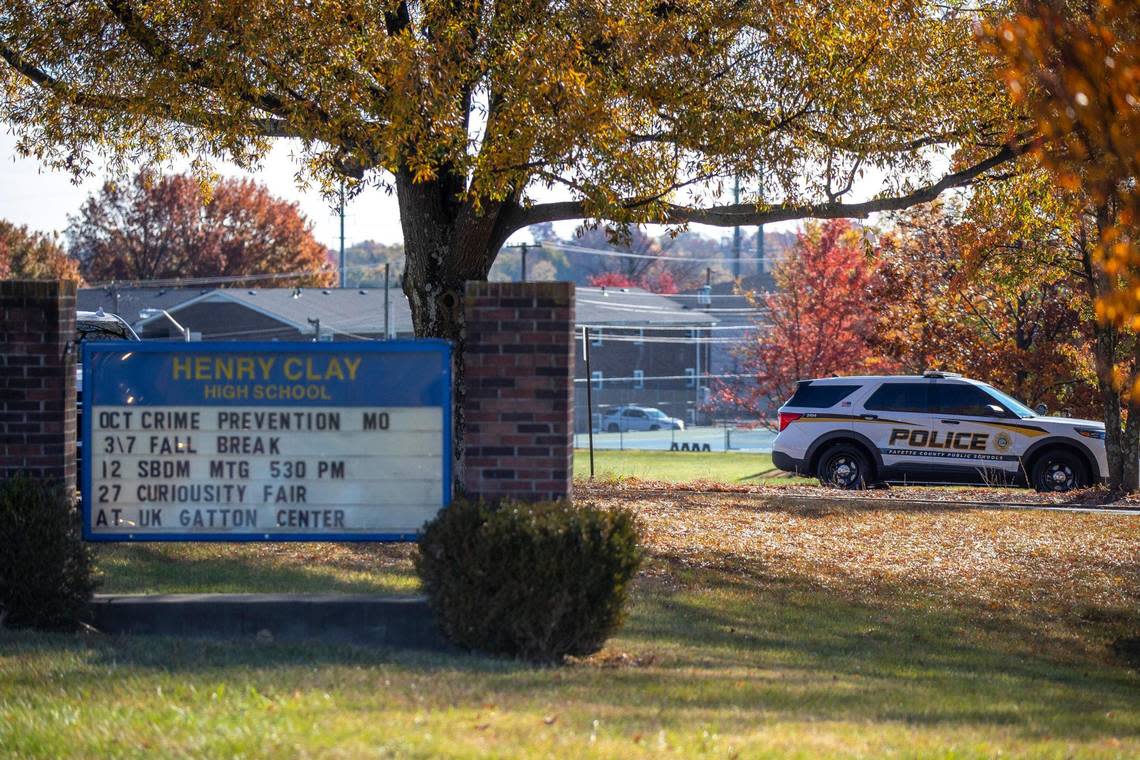‘Something needs to be done.’ Father of Henry Clay student speaks out about fighting

The father of one Fayette County high school student said he is concerned about fighting after his son was recently assaulted at school.
A recent review of records by the Herald-Leader found that school resource officers have investigated nearly 90 physical altercations since the beginning of the previous school year. Fourteen of the fights occurred from the beginning of this school year through Oct. 20.
Garry Milton said his son, a junior at Henry Clay High School, was assaulted in a classroom last month.
Milton said his son was sitting in a second-period class Nov. 14 when “this kid came up behind with a computer, like a laptop computer, and hit him in the back of the head.”
He said his son got up and fought back before staff intervened.
“It was a serious thing,” Milton said. “He could have really hurt my child really bad.”
Milton said he has spoken with school police and the commonwealth’s attorney about the incident and plans to pursue criminal charges against the student.
A Fayette County Public Schools police report on the incident states that one of the students told police that the other student hit him in the back of the head three times with a Chromebook before he “tackled (name redacted) to the ground and punched him in the face.”
The student who started the fight said he did so because the other student “was calling him names (such as ‘b****’) and would not stop.”
“The issue may stem from previous text messages exchanged between the two students,” the report states.
Milton said the student who hit his son with the laptop had texted his son before the incident.
“He was saying ‘I want to take your sister out.’ ... He was saying some vulgar things, what he was going to do,” Milton said.
Milton said his son told him, “Do not ever come around my sister,” and thought that was the end of it.
Milton said the student who assaulted his son has since returned to school.
Milton said his son is “fine” physically but is still having some anxiety about what happened: “He told me it was mentally disturbing to him. He’s having to look over his shoulder all the time.”
“I just feel like something needs to be done,” he said. “They’re having fights over there all the time.”
District spokesperson Dia Davidson-Smith said in a statement that the district is addressing conflicts.
“The safety and well-being of our students and staff are of paramount importance to us and any reports of these types of incidents are taken very seriously,” she said in the statement. “Addressing and mitigating conflicts when they arise and ensuring a safe learning environment for everyone remains the top priority for the superintendent and the entire FCPS Team.”
She reiterated that the district is using strategies including conflict resolution programs and increased supervision “in sensitive areas” to try to mitigate the problem and is “working closely with students, parents, and staff to promote a culture of respect and understanding.”
Getting to the root of the problem
Katherine Stone, a licensed psychologist who has practiced in Lexington for more than 20 years, said a number of factors can contribute to aggression among young people, including lack of parental support, a sense of loneliness and substance abuse.
Kids who are abused are also at higher risk for becoming aggressive, as are those who have a history of exposure to violence.
Young people who experience anxiety also may become aggressive when their “fight or flight” instinct kicks in.
“Anxiety and aggression go hand in hand,” Stone said.
A lack of sleep leads to moodiness and irritability and can be a precursor to aggression as well.
She said technology contributes to that, since kids may be up all night on their phones or other devices.
“We have a sleep deprived group of teens these days,” Stone said.
She said technology also means “teens get less breaks from social stress” than teens did decades ago, when a family might have shared one landline phone, as opposed to kids now who have their own phones, allowing them to interact with peers constantly.
And, Stone said, sometimes “because so much of the communication is on devices, they don’t know how to communicate in person very well.”
She said she’s also personally concerned about the impact of online influencers who spew hateful and misogynistic viewpoints.
Stone said warning signs for violent behavior among young people can include intense anger, frequent loss of temper or blowups, a tendency to become excessively frustrated and extreme irritability and impulsiveness.
She offered several tips for parents who might be concerned about violent or aggressive behavior:
“Focus on emotional regulation,” she said. “First, parents need to model it.”
“Teach stress tolerance.”
Help kids learn mindfulness techniques, which help with “being able to be present in the moment.”
Work on interpersonal skills so kids develop the ability to get along with others.
She said school counselors can also be great resources for helping parents work on these issues.
Herald-Leader education reporter Valarie Honeycutt Spears contributed to this report.
Three charged, pepper spray used after a fight at Lexington’s Henry Clay High School
Henry Clay fight left officer with broken finger, but one mother says authority was abused
